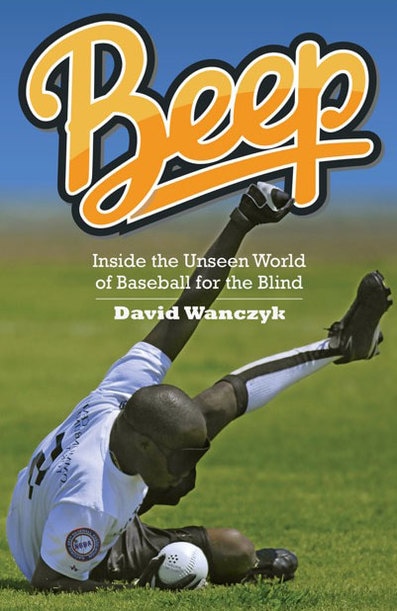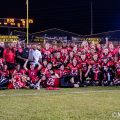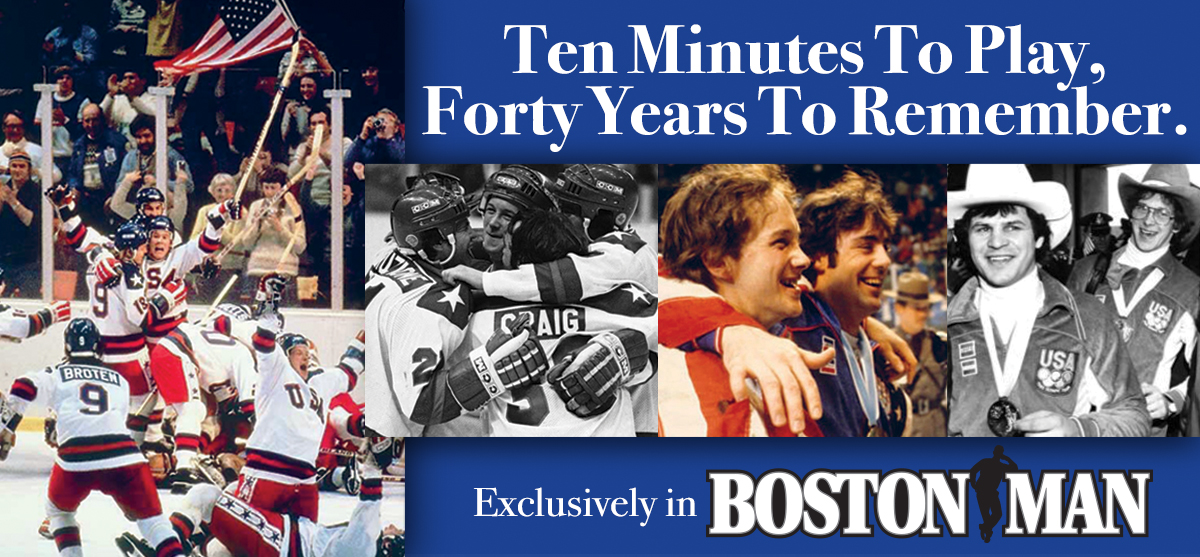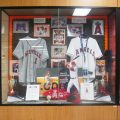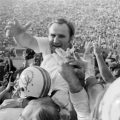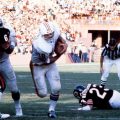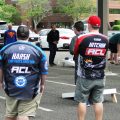Beepball Wizards – The Boston Renegades
When a magazine suggests you write a piece about blind baseball players, you have to take on the assignment just to see how in the wide world of sports such a thing is possible. But indeed it is, and I covered the Boston Renegades for the Summer 2019 issue of BostonMan. You can read the article on their website here, or see the magazine article PDF here.
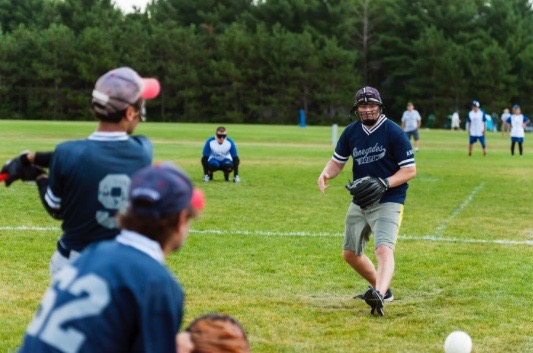
Beepball Wizards
The Association of Blind Citizens Boston Renegades are a powerhouse in Beep Baseball, a form of baseball played by legally blind people.
On the website for the Association of Blind Citizens Boston Renegades, the local Beep Baseball team, you can find a short video trailer for their documentary.
In the video, mere seconds after one player tells his heart-wrenching story of being literally struck blind, coach Rob Weissman is seen reprimanding his team. “You guys are going to pay for this bad practice,” he informs them. In another scene he lectures to a player, “Life isn’t fair. I worked my ass off when I played ball. I got cut every friggin’ time.”
Imagine telling a blind person that their desire is questionable. Talk about tough love.
But that’s exactly the point. At the end of the video, that same coach is seen firing up his players before the game, reminding them what success on the field is about. It’s about respect.
Rob Weissman cares enough to take a team of blind baseball players at the bottom of their league and mold them into dominant yearly contenders. In the last three seasons, they’ve compiled a 40-8 record and played in a national title game.
As coach says of the endeavor, it’s about more than winning games. It’s creating a culture of working together to achieve goals.
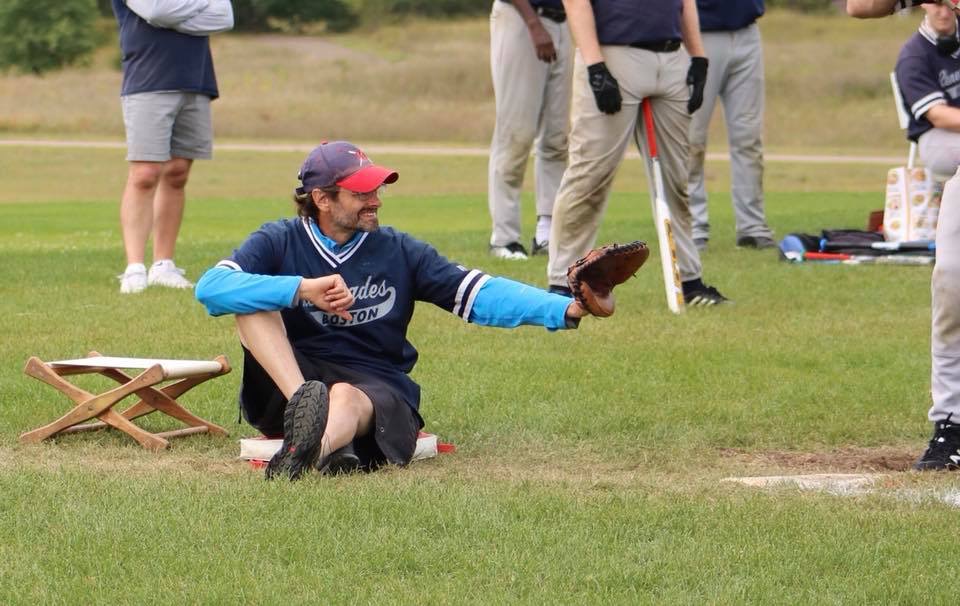
Rob Weissman isn’t as rough as he appears to be. He’s just a good coach.
When asked about the video, Weissman chuckles knowingly, as if he’s fielded the question a few thousand times. He gets that it’s dramatization and that a viewer’s reaction is exactly the goal of the trailer, but he’s nowhere near that hard-nosed coach that comes across in a small few captured moments. “It’s a teaser,” he asserts for the record. “If I was that tough, no one would be with this team.”
As he explains, there was a desire to change the team culture at the time, and someone needed to take the bull by the horns and lead the way.
“They made a decision that they wanted to be competitive, but a lot of them had never been part of a competitive team. So a lot of learning needed to happen. It wasn’t going to be ‘let’s go get pounded by the top teams in the league, and everyone’s going to love us, because they’re going to beat the crap out of us and we’re going to pay for the beers afterwards, which is what it was early in the history of the team.
“I said, look, I’ll be able to get this team up and running and I’ll be able to bring in great volunteers, but we have to change the culture.”
It’s worked. Weissman and his staff…he is quick to credit team owner John Oliveira, coach and pitcher Peter Connolly, pitcher Ron Cochran and coach Bryan Grillo among others…have created a winning atmosphere in Boston beepball. All with home grown talent.
“I think that we are the only team in the history of the league to go from being the doormat of the league to making a title game, only using players from our roster,” Weissman notes. “A lot of other teams will bring in people from other cities. We’ve never done that. Every one of our players has grown up in our system. We’re really proud of that.”
Sometimes working your ass off is worth it.
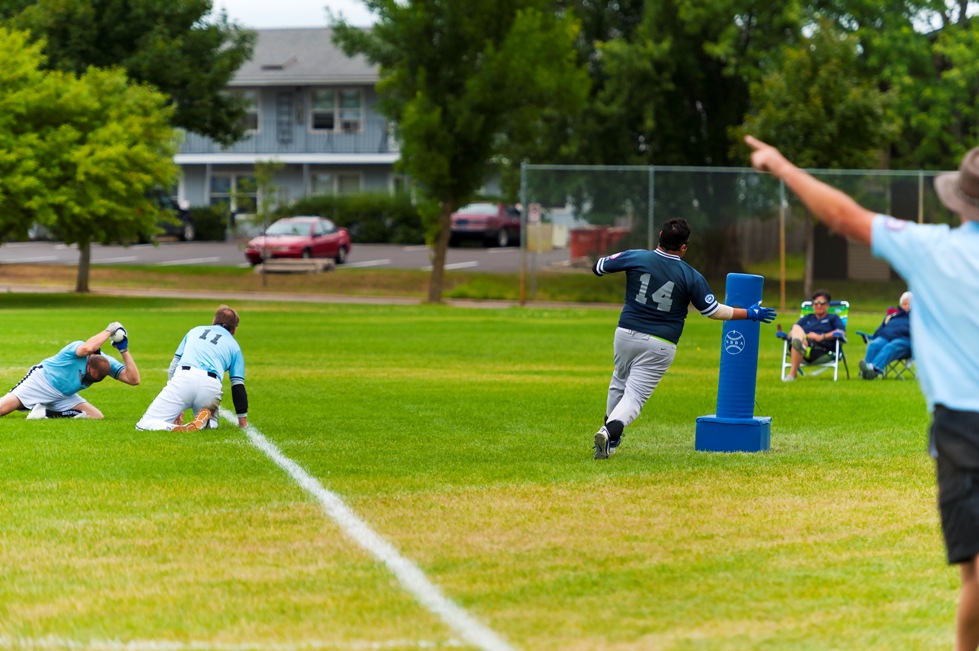
Baserunning is equally important in Beep Baseball.
Baseball for the blind. The words invoke instant confusion. Of the senses most needed to play baseball, vision easily tops the list.
Before you ponder how it’s possible for a someone to play baseball without seeing, consider this: there is a nationwide league. The National Beep Baseball Association features teams not just in Boston, but also in Chicago, Vegas, even Anchorage. There are 35 NBBA teams in all, and yes, there is a World Series.
Beep Baseball works like this: all players except the pitcher and catcher are completely blindfolded, to play on the same vision level despite their degree of blindness. The ball is softball-sized and is built with a beeping device in it, so defensive players can field it by following the sound when the coach calls out the fielding formation.
Batters are given four strikes, and the pitcher plays for the offensive team. The pitcher calls out to the batter when the pitch is thrown, and attempts to put the ball in the batter’s swing zone. If the batter makes contact and manages to hit the ball at least 40 feet, the defensive team moves to field the beeping ball. A ball hit further than 180 feet is considered a home run.
There’s no baserunning in the traditional sense. After contact, the batter runs towards one of two pylons that serve as bases, whichever one is buzzing. If a batter reaches the pylon before the ball is fielded cleanly, a run is scored. If the ball is fielded cleanly before the batter makes the bag, the batter is out. Games last six innings, or more if needed.
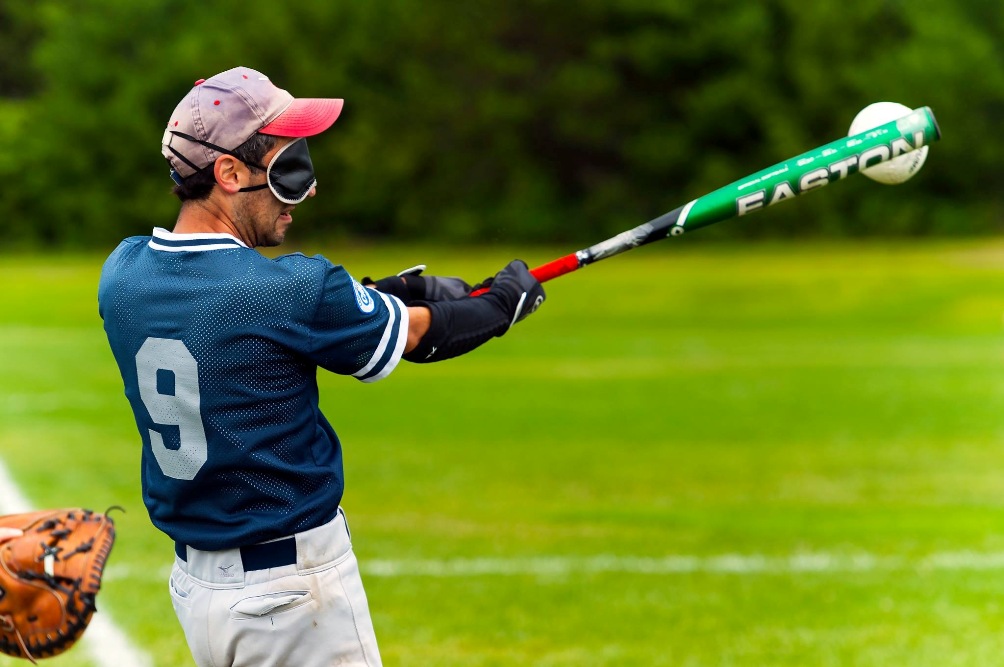
A contact hitter.
It’s easy to argue that a professional ballplayer hitting .350 is one of the most impressive achievements in sports. But even with a pitcher grooving the ball in a batter’s swing zone, it’s pretty impressive to see a blindfolded batter put a ball in play. If someone claimed that the Force was strong in better hitters, it wouldn’t be difficult to believe.
Peter Connolly, a pitcher and coach for the Renegades, explains the mechanics, and how hitters learn and improve their skills.
“It’s a combination of knowing your swing, being consistent, just honing in on your consistency. Maybe getting a little more power, maybe being able to go the other way in certain situations.
“If you can pop the ball up in the air for four seconds, you have a really good chance of getting to the bag. That’s another thing that you can hone onto, base running and getting faster. If you watch the good teams in the World Series, they have such speed that if they hit the ball and you don’t field it perfectly, it’s too late.”
Weissman agrees that just as with any sport, the skills can be learned. “We’ve all learned a lot over time about how to coach the sport better. And we’re constantly working on hitting mechanics.
“Joe Yee hit like 400 points higher than his career batting average last year. Some of that was him learning how to improve his individual skills, and being coachable enough to learn about how to move his hands, to be more aware of his bat path, to learn how to transfer his weight.”
Yee, incidentally, is Connolly’s cousin, and it’s an impressive pitcher-hitter battery.
“I think he was batting like .600 or something off of me last year,” Connolly says.
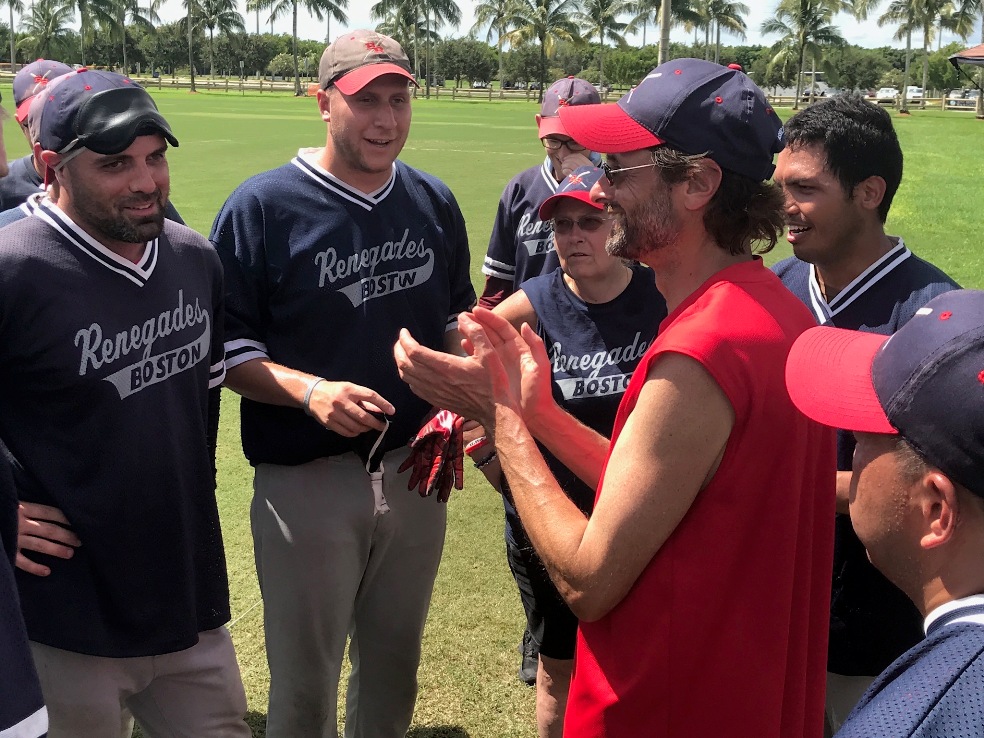
Weissman leading a newly inspired Renegades club.
Despite that Rob Weissman disavows his appearance as a tough coach, he does point out that players on his team want to be treated like athletes, not disabled people.
He amusingly remembers the story of Steve Houston, a former college ballplayer who lost his sight to diabetes, growing visibly annoyed and chewing out a pitcher for “babying” him when he learned the pitcher was throwing underhand to him. It’s impossible not to admire the mental fortitude of a player who believes he can handle a high hard one while blindfolded.
That said, Weissman knows there are limits in some cases. The Renegades don’t cut players, and anyone who is willing to make the financial and time commitment can play.
“One of our players, Melissa Hoyt, has Mitochondrial disease. It makes it very hard for her to breathe at times. We have another player named Rob, doctors told him he’d never play competitive sports. He’s a diabetic, so they’ve got other issues. We can’t put them out and play them 18 innings in a day. I know that they’re not gonna make it through warmups without having to take a break.
“But they’re great teammates. They’re very supportive and everyone’s very supportive of them. One of the most memorable moments that we had last year was when Melissa, who’s been with the team for a very long time, scored her first run. Every single coach and player on the team was just fired up about that.
“One of the things that’s so cool and unique about this team is just how everyone supports each other. And that we get wins in various ways.”
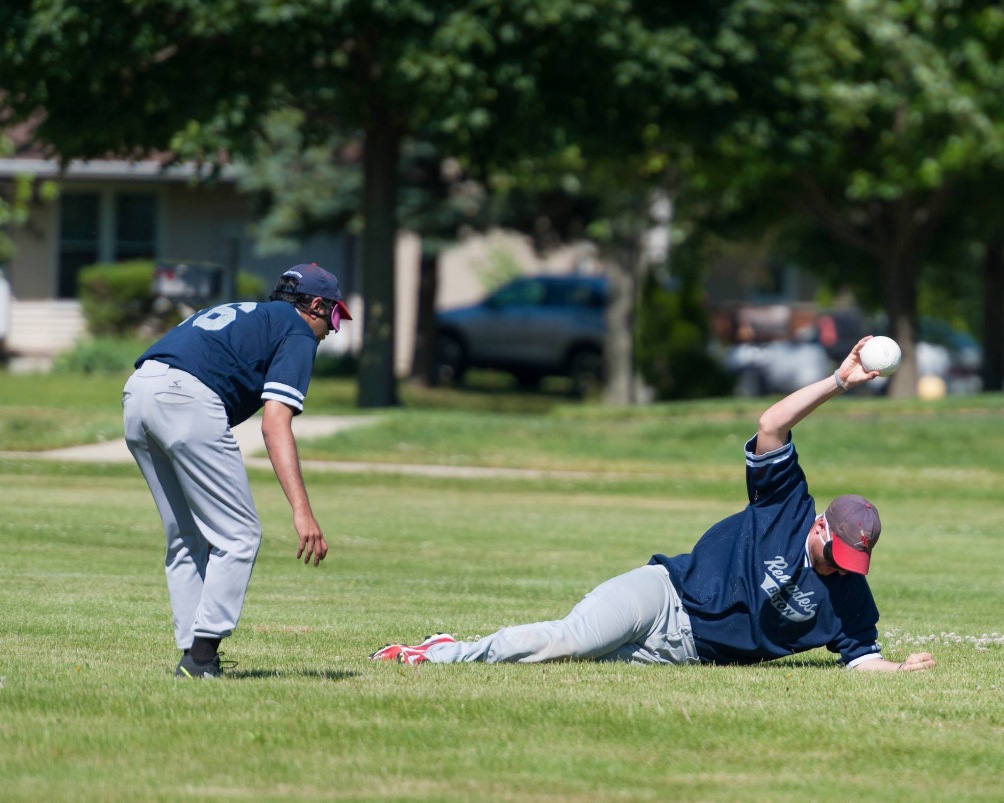
Play hard. Represent your city.
Back in 2003, Rob Weissman, John Oliveira and company had a vision. To give blind citizens in the Boston area a chance to come together and achieve something special, through baseball of all things.
Mission accomplished.
“When we took the field in the championship game,” Rob reflects, “for me, I think that was one of the proudest moments. It was like the Red Sox winning in 2004. And we wouldn’t have gotten here without the help of every single coach and player, past and present.”
Does Rob Weissman see a World Series victory in the Renegades’ future?
“I’d love to sit with you and say, our goal is to win a championship. But I think our goal every year is to be the best that we can be.”
Did this post make your day a little bit?
I hope so. If it did, I would really appreciate your support.
When you use this link to shop on Amazon, you’ll help subsidize this great website…at no extra charge to you.
Thanks very much…come back soon!
The Book of Beep Baseball
David Wanczyk, an English professor at Ohio University, was enthralled enough by the idea of beep baseball that he wrote a book about it, Beep: Inside the Unseen World of Baseball for the Blind.
In it Wanczyk chronicles the history of the sport, and documents the adventures of beep baseball teams, including the Renegades and Weissman’s fanatical dedication to coaching and winning.
Here’s a passage from Wanczyk in the book about Weissman:
“Like any manager, he’s concerned about injuries, field conditions, the umpires, the draw. And like some, he’s battling precompetition butterflies, otherwise known as chronic indigestion. Weissman doesn’t really eat, and when he does, he eats Pop-Tarts, two or three a day, like a college-student gamer somehow gluing together his wild thoughts with hard frosting. But Lisa Klinkenborg, the Renegades’ resident trainer/nutritionist, has forgotten to buy his Pop-Tarts on her grocery run, unf***ingbelievable, and he’s not sure where his next meal is coming from. He’s really not sure anymore.”
Wanczyk tells BostonMan this about Weissman: “He certainly stresses about the game, let’s say that. He’ll probably tell you more. And if you have trouble getting him to tell you, you can mention that my book says something about this and that I make the connection between his efforts and his health. If he wants to dispute that connection, he’ll probably do it in a colorful way!”
But Weissman isn’t the only dedicated one, as Wanczyk and his book point out. Beep Baseball features all of the intense struggle of competition within limits.
“The action on the field is fast-paced, and you’re watching dare-devil sorts of diving and colliding. But once the inning is over and the players make their way back to the bench, they will often move pretty slowly, listening for the voices of their coaches, or even finger-snaps to help them get to the bench.
Wanczyk makes the interesting point that “beep ball is about pushing limits, but those limits are part of the game. If a player runs as hard as he wants to, he overruns the ball. Blind people can do a lot, but they still have to do it deliberately, and coincidentally, that patient speed is the best way to succeed in beep ball.
“In Boston, we’ve always liked baseball underdogs. The Renegades are an underdog, and they’re always rallying.”
If you’re interested in a copy of Beep: Inside the Unseen World of Baseball for the Blind, it’s available on Amazon or at www.davidwanczyk.com.
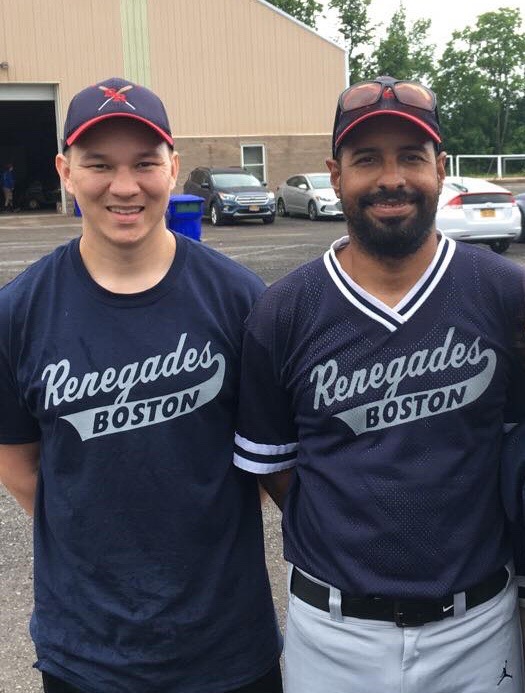
They play hard, like any Boston team.
Support The Renegades
The Association of Blind Citizens in Boston currently operates the Renegades, and being a non-profit, they are always looking for volunteers, players, and donations. Rob Weissman says they have some creative ways to fund and operate the team, but they can always use help.
“Some of our volunteers, they work for big name companies. Like myself, I work for IBM, one of our volunteers, Aaron Proctor works for JetBlue. JetBlue and IBM are also very big proponents of volunteerism, so they’ll support us and donate money to the team or in JetBlue’s case, they’ll donate plane tickets to the team.
“The Challenged Athletes Foundation is an amazing organization; they allow players to apply for grants and they have been extremely generous and supportive. About seven or eight of our players were able to get almost $750 each out of the challenge that so that gets them halfway there on their fundraising.
“Regionally we travel with between 20 and 30 people. That’s a lot of people to put into hotel rooms. If you’re willing to donate to a cause, our budget’s $20-25,000 a year and any little amount helps.”
In addition, Coach adds the most important thing the Renegades need…volunteers and players.
“We’re always looking for great volunteers, if people have baseball skills, or time or any skills that they could offer. We’re always looking for people. This team would not survive without volunteers.
“At the same time, if you know somebody who’s visually impaired, we’re the only team sport that exists in Massachusetts. Have them get in touch with us and come try it out. It’s amazing, so many of the guys get so much out of it other than just playing sports. This goes well beyond baseball.”
If you’d like to make a donation, volunteer, or get the Renegades in touch with a blind person interested in playing ball, you can visit the website at www.blindcitizens.org/renegades.
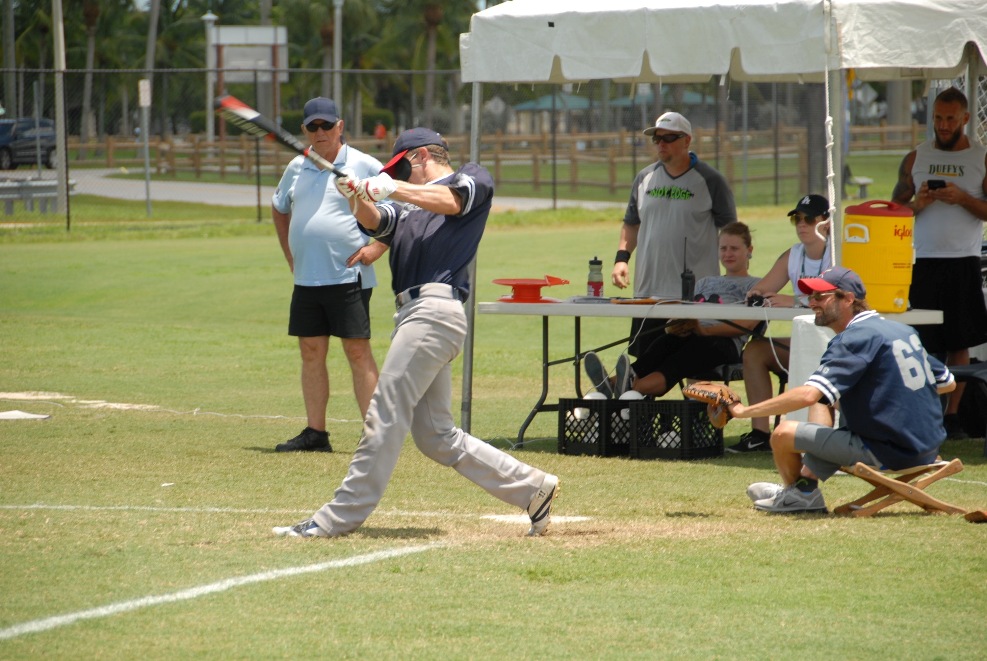
Christian Thaxton, with the sweet swing that brought his bat to Cooperstown.
Making Cooperstown
The Boston Renegades’ website includes their top ten moments of the 2018 season. At the top of the list is their visit to the Baseball Hall of Fame, to see the exhibit of Christian Thaxton’s bat. There is a video of Thaxton, the top hitter in the history of the league, being shown the exhibit.
A year later, Weissman’s voice still cracks a bit telling the story.
“Baseball was in his blood. He played high school ball, he ended up getting onto a junior college baseball team and then finding out that he couldn’t see the inside fastball anymore, and that was the pitch he crushed.”
Thaxton went to see an eye doctor and was informed he was going blind.
“He dusted himself off quickly. He made a decision that he was going to come to Boston to learn skills to be a blind person, to go into the Carroll Center for the Blind in Newton.”
At the Carroll Center, he heard about the Boston Renegades, and it turned out he could still hit a baseball pretty well. Enough to make him want to stay in Boston.
“When he set the record for the highest batting average in the history of the league, Cooperstown came calling and said, we’d like to put his bat in the Hall of Fame. And last year, being with Christian and seeing him see his bat in a display case in the Hall of Fame, after everything that he’s been through, was amazing.”
And well deserved.
“Christian isn’t the type of athlete who’s all about himself,” Weissman adds. “He has taught so many of his teammates proper mechanics to swing. He takes such great joy out of seeing his teammates succeed. That’s who he is as a person.
“To give him the opportunity to see his bat in Cooperstown was unbelievably heartwarming.”
(all photos for this piece are courtesy of Rob Weissman, Lisa Andrews, David Wanczyk, and John Lykowski Jr.)
This post contains affiliate links. If you click on the links and then make a purchase, the site owner earns a commission at no extra cost to you. Thanks for your support.

